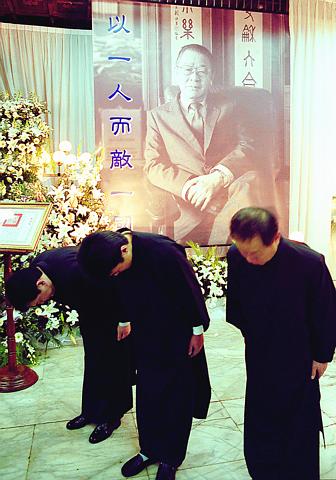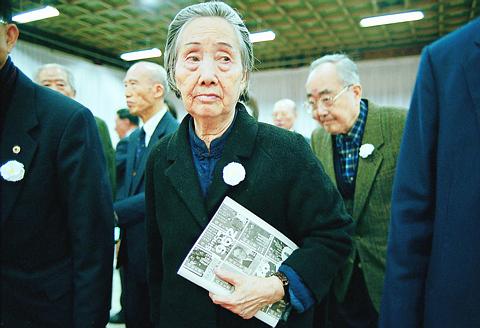Liu Shao-tang (劉紹唐), founder and publisher of the monthly magazine Biographical Literature (傳記文學), was eulogized yesterday during a funeral service in Taipei. Liu died on Feb. 10 of lung cancer, aged 80.
Historians that came to the service said Liu's efforts in collecting first-hand historical records on Chinese history from 1911 to the present day helped fill the gaps in official accounts of the same period.
"Liu has been dubbed as the head of the `unofficial Academia Historica,' and his contribution to the study of modern Chinese history is of paramount importance," said Chang Yu-fa (張玉法), a research fellow at the Institute of Modern History at Academic Sinica.

PHOTO: CHEN CHENG-CHANG, TAIPEI TIMES
Pouring rains and Chinese classical music greeted long lines of mourners who attended the service, held in the Chinghsing Hall at Taipei's First Funeral Parlor yesterday morning. Among those attending were officials, retired officials, scholars, and Huang's relatives and friends.
Two of Liu's old friends -- Liang Su-jung (梁肅戎), former Legislative Yuan speaker, and Pok Shau-fu (卜少夫), a veteran newsman -- gave their eulogies. Also invited to express his thoughts on Liu was Taipei Mayor Ma Ying-jeou (馬英九).
"I didn't see this occasion merely as an official engagement in which I as the Mayor of Taipei came to pay tribute to the founder of a monthly magazine published in Taipei. I am here to pay my respects to someone who has devoted his life to the development of culture," said Ma.

PHOTO: CHEN CHENG-CHANG, TAIPEI TIMES
In addition to praising Liu's devotion to the monthly magazine for the past 38 years, Ma expressed his own personal fondness of the publication.
"During a time when extracurricular reading materials were relatively scarce here in Taiwan, the magazine gave me an opportunity to probe the life histories of important figures in modern Chinese history. It served as the best of learning materials for me," he added.
Liu gained fame long before founding the magazine in 1962. In 1951, he published a book titled Out of Red China (紅色中國的叛徒) in which he recounted his experiences as a reporter at the Chinese Communist Party's (CCP) Xinhua News Agency, and his days in the CCP's People's Liberation Army (PLA).
Liu also described why it was he decided to leave the Communist Party after one year within the organization.
Since publication of the book, Liu was seen as a well-known anti-communist writer.
The US Information Service (USIS) later translated the book into more than ten languages as anti-communist propaganda, during a time when containment of communism was a mainstream doctrine in the West.
For historians, however, it is Liu's endeavor to found the magazine, focusing on biographic writing, that made him a key figure in preserving a record of modern Chinese history.
For this, Liu won a 1996 National Literary Award (國家文藝獎), conferred by the Council for Cultural Affairs.
Liu founded the magazine in Taiwan in June 1962, at the age of 40. It coincided with an era when publishing contemporary history could land an author in jail.
Until this year, the magazine has been published uninterruptedly for a total of 452 issues, relying on a single editor, no advertising revenue, and no subsidies. Cultural critics often described the magazine's longevity as "a miracle" in Taiwan's publishing industry.
Chang said Liu's decision to launch the magazine was influenced by Hu Shih (胡適), the great thinker. "Hu was an advocate of biographic writing. He believed that everybody should write their own stories to serve as eyewitnesses to their times. And Liu carried out Hu's dream," Chang said.
The majority of the articles released in the magazine were first-hand materials because many were accounts of personal experiences, chang said.
"These publications are very helpful to historians focusing on modern Chinese history," he said. "But for the existence of this magazine, I believe many of the precious historical accounts would have disappeared for good."
But historians also admit that the publication had its dark days -- Liu started the journal recording events and dissecting the actions of important figures, back during the time when Taiwan was still under martial law.
Chen San-ching (陳三井), a research fellow at the Institute of Modern History at Academic Sinica, gave a vivid example.
"When the magazine touched upon sensitive political issues, such as how many women Sun Yat-sen (孫中山), founder of the Republic of China, had in his life, the authorities were concerned, fingering Liu as a tool of the communists," Chen said.
But the magazine stands out as a pinnacle of achievement among those of its kind in Taiwan and China, Chen said. "In terms of content, quality and accuracy, the magazine is an unprecedented accomplishment."
On March 30, a panel discussion on the contribution of the magazine to the study of modern Chinese history will be held at the mayor's former residence, now a venue for cultural events.
According to the organizers of the event, a one-month exhibition on Liu's life will be held concurrently at the same venue.

AGING: As of last month, people aged 65 or older accounted for 20.06 percent of the total population and the number of couples who got married fell by 18,685 from 2024 Taiwan has surpassed South Korea as the country least willing to have children, with an annual crude birthrate of 4.62 per 1,000 people, Ministry of the Interior data showed yesterday. The nation was previously ranked the second-lowest country in terms of total fertility rate, or the average number of children a woman has in her lifetime. However, South Korea’s fertility rate began to recover from 2023, with total fertility rate rising from 0.72 and estimated to reach 0.82 to 0.85 by last year, and the crude birthrate projected at 6.7 per 1,000 people. Japan’s crude birthrate was projected to fall below six,

Conflict with Taiwan could leave China with “massive economic disruption, catastrophic military losses, significant social unrest, and devastating sanctions,” a US think tank said in a report released on Monday. The German Marshall Fund released a report titled If China Attacks Taiwan: The Consequences for China of “Minor Conflict” and “Major War” Scenarios. The report details the “massive” economic, military, social and international costs to China in the event of a minor conflict or major war with Taiwan, estimating that the Chinese People’s Liberation Army (PLA) could sustain losses of more than half of its active-duty ground forces, including 100,000 troops. Understanding Chinese

US President Donald Trump in an interview with the New York Times published on Thursday said that “it’s up to” Chinese President Xi Jinping (習近平) what China does on Taiwan, but that he would be “very unhappy” with a change in the “status quo.” “He [Xi] considers it to be a part of China, and that’s up to him what he’s going to be doing, but I’ve expressed to him that I would be very unhappy if he did that, and I don’t think he’ll do that. I hope he doesn’t do that,” Trump said. Trump made the comments in the context

SELF-DEFENSE: Tokyo has accelerated its spending goal and its defense minister said the nation needs to discuss whether it should develop nuclear-powered submarines China is ramping up objections to what it sees as Japan’s desire to acquire nuclear weapons, despite Tokyo’s longstanding renunciation of such arms, deepening another fissure in the two neighbors’ increasingly tense ties. In what appears to be a concerted effort, China’s foreign and defense ministries issued statements on Thursday condemning alleged remilitarism efforts by Tokyo. The remarks came as two of the country’s top think tanks jointly issued a 29-page report framing actions by “right-wing forces” in Japan as posing a “serious threat” to world peace. While that report did not define “right-wing forces,” the Chinese Ministry of Foreign Affairs was